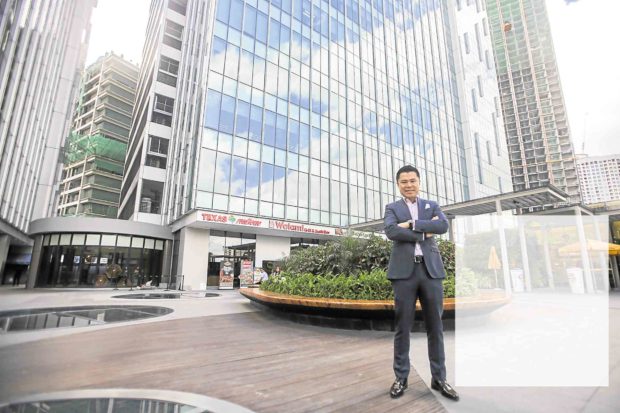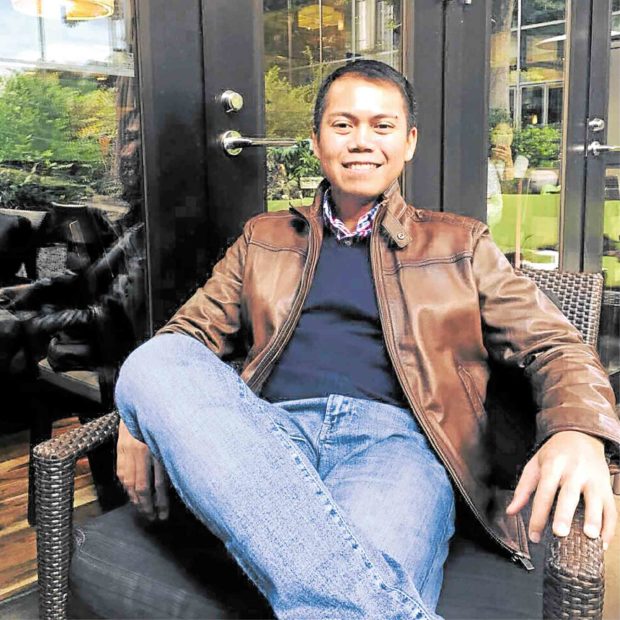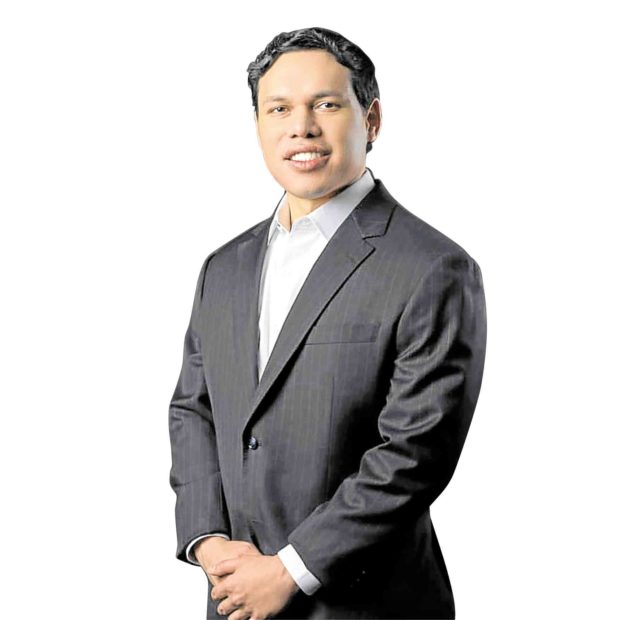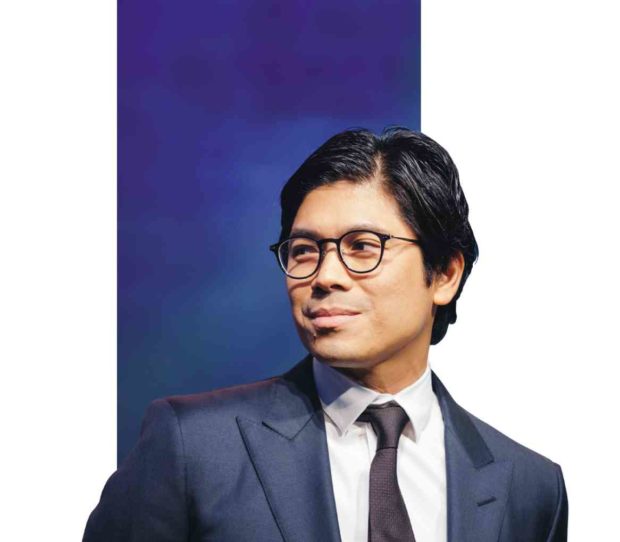Youngblood of real estate
The Philippine real estate industry is bound to get even more exciting in the coming years as the youngblood of prominent families in property development start to make their own legacies in the field.
In the recent years, we see more of the younger generation at the forefront of real estate as their elders begin to pass the baton to them, ushering in new leadership in the industry and giving more room for them to put into practice what they have learned while growing up in the business.
The most thrilling thing the industry can look forward to is not just how they will continue the good work already done, but how they will become the new gamechangers with bigger ideals, bolder moves, and ambitious plans in developing projects that will benefit Filipinos in the future.
 KEVIN TAN
KEVIN TAN
Kevin Tan, chief executive officer of Alliance Global Group. Inc (AGI) and executive vice president of Megaworld Corp., took on a role of being a sales agent—the one you find in malls, handing out flyers to sell condominium units.
Despite being the eldest son of visionary tycoon and Megaworld chair and founder Andrew L. Tan, Kevin had to work his way up just like any employee.
Joining the workforce
Kevin, who just turned 40 this year, was only 22 when he joined the family business in the early 2000s.
After earning a bachelor’s degree in business administration, major in management from the University of Asia and the Pacific, Kevin collected close to two decades worth of experience in retail leasing, marketing and operations. Earlier in his career, he even took the role of a salesman who had a regular quota and had to report to a sales director. These experiences groomed him to become a force to reckon with in the retail and real estate industry today.
Kevin was previously the first vice president for the commercial division at Megaworld, a job that put him in charge of the company’s entire mall business. This meant he was in charge of planning, development, marketing, operations, and leasing of the Megaworld Lifestyle Malls.
Today, he is the executive vice president and chief strategy officer of Megaworld and the new CEO of AGI after the elder Tan retired as CEO of his property, gaming and globalizing consumer empire.
AGI is the parent firm of Megaworld, integrated gaming developer Travellers International Hotel Group, global beverage-maker Emperador Inc. and the Philippine McDonald’s master franchise-holder Golden Arches Development Corp.
The younger Tan also currently leads AGI’s newly created unit, Infracorp Development Inc., the group’s vehicle for infrastructure-building.
Brainchild of Kevin
Kevin actually pitched the idea of starting a mall business and incorporating these malls in the developments of Megaworld. The company’s upscale lifestyle malls, which include Eastwood Mall, Newport Mall, Venice Grand Canal Mall, Uptown Mall and Lucky Chinatown, are known for their unique themed designs.
The company also has the so-called “community malls,” such as San Lorenzo Place, Paseo Center, Three Central, Village Square, Forbes Town and Mactan Alfresco, which are relatively smaller premier malls that are just a stone’s throw away from upscale residences.
Megaworld opened Festive Walk Mall in Iloilo last year, its largest lifestyle mall development outside Luzon. Another provincial mall is the Southwoods Mall, its 14th mall located in Biñan City, Laguna.
In the opening of Southwoods Mall, Kevin had said, it “will be another showcase of how we want our next lifestyle malls to look like (while) keeping in mind the distinct character of every township that we’ve built.”
Eight new malls and commercial centers are set to open in the next three years in Cebu, Bacolod, Davao, Boracay, Cavite and Pampanga, as Kevin envisions to have a mall in every Megaworld township and continue to support local entrepreneurs in their retail developments.
In August, Megaworld Lifestyle Malls launched a new logo, unveiled in time for the property giant’s 30th anniversary this year. Kevin said the logo was given fluidity and flexibility and an appeal that transcends age, identity and culture.
Meanwhile, integrating arts and culture in the company’s townships is another strategy the younger Kevin plans to take.
A prime example of this is Megaworld’s Iloilo Museum of Contemporary Art (Ilomoca), which he said, has opened the eyes and the minds of the arts community in the province. The Arco de Emperador, unveiled this year, and an upcoming museum in Arcovia City are expected to create the same effect.
As head of the conglomerate, Kevin announced in June this year the company’s five-year digital transformation plan to address its need to adapt to technological changes and innovations of the modern times.
And as Megaworld celebrates its 30th year, it has in its arsenal a new gamechanger who will breathe life into the business empire founded by the elder Tan three decades ago.
 DELFIN ANGELO WENCESLAO
DELFIN ANGELO WENCESLAO
After finishing his studies in Ateneo de Manila University and eventually in Massachusetts Institute of Technology (MIT), Delfin Angelo “Buds” Wenceslao went straight into real estate as a broker.
Today, Buds is the CEO of property and infrastructure developer D.M. Wenceslao & Associates Inc. (DMW) after he was appointed in 2016. He is the managing director of DMW’s real estate subsidiaries including Aseana Holdings Inc. and Aseana Residential Holdings Co.
Buds also serves as the national chair of the Urban Land Institute (ULI) Philippines and is a member of the Philippines Association of Real Estate Brokers, IT and Business Process Association of the Philippines (IBPAP), the Pasay Makati Realtors Board, and the Massachusetts Institute of Technology Education Council.
Next generation
DMW was started in 1960 with the vision of Buds’ late grandfather Delfin M. Wenceslao Sr. to elevate the country’s urban landscape. Today, Buds is the CEO while his father, Delfin J. Wenceslao Jr. is the chairman of the board for DMW.
As CEO of DMW, Buds aims to build a “next generation city.” He envisions Aseana City, a 204-hectare mixed-use district fronting Manila Bay, to be the entertainment and lifestyle center of the Philippines.
Last March, Aseana City’s latest mixed-use development project, the Parqal, began construction. With this 5-ha development, DMW takes another step towards building a world-class and progressive city, as the project would become the most modern and integrated mixed-use development in the area.
In creating the “next generation city,” Buds wants to strive for more sustainable developments. Parqal will dedicate 60 percent of its total lot area to lush green landscapes and recreational facilities to address the need for more open spaces in a modern urban setting.
Topped off this year was Pixel Residences, the first mixed-use residential condominium in Aseana City. With this development, Buds said DMW built a minimalist façade reminiscent of pixels, and prioritized the comfort and security of residents while having your modern conveniences nearby.
Meanwhile, the company’s other hotel, retail and office developments are set for completion between now and 2021.
DMW subsidiary Aseana Holdings Inc., the developer of Aseana City, was earlier cited by BCI Asia for its high value portfolio of hotel, retail and office developments in this area.
At the end of September this year, DMW grew its net profit by 11 percent year-on-year to P1.65 billion, with the surge in revenues from the residential development segment contributing to the steady earnings.
 MANUEL PAOLO VILLAR
MANUEL PAOLO VILLAR
At the age of 42, Manuel Paolo Villar has proven himself to be a major player in the business, making a name for himself in the real estate empire built by his father.
The eldest son of business tycoon Manuel Villar Jr. and Sen. Cynthia Villar did not immediately venture into the same industry nor did he hold a position in one of the family businesses after finishing his studies.
Upon graduating from the Wharton School of the University of Pennsylvania with a bachelor of science in economics and bachelor of applied science in 1999, he worked for global management consulting firm McKinsey and Co. in the United States. It was only in 2001, two years after he finished his studies, when Paolo then returned to Manila to join the Vista Land group, where he held various senior positions.
Since then, Paolo became the chief financial officer of Vista Land and Lifescapes Inc. and became instrumental in the public listing of the property developer on the Philippine Stock Exchange.
In 2011, a decade since he started working for the company, Paolo was appointed president and chief executive officer.
Vista Land is one of the leading home builders in the country, providing a wide range of housing products to customers across all income segments. The company sells house-and-lot packages and residential lots under the Brittany, Crown Asia, Lessandra and Camella brands.
Representing the group of companies, Paolo wanted to expand the company’s footprint by evolving with advanced technologies. In December 2019, the Villar Group partnered with Multisys Technologies Corp., a leading software solutions company, to deliver game-changing solutions that will benefit its consumers.
With Paolo at the helm of the Vista Land group, he has been outspoken about their family’s plans to diversify their businesses.
In April 2018, he announced that the Villar family intended to venture into other capital-intensive businesses like telecommunications, integrated gaming and even infrastructure. September of the same year, President Rodrigo Duterte approved the Villar-owned Streamtech Systems Technologies Inc.
Being a property-based group, Paolo pointed out, could be an advantage to their plans of going into the telecom business as their developments could be used for the needed telecom infrastructure.
For Paolo, another industry where having real estate assets could be an advantage is the gaming industry, where the family also plans to establish a business. The group has applied for a gaming license with the state-run Philippine Amusement and Gaming Corp. before Malacañang ordered a moratorium on the processing of new applications last year.
Through investment and holdings company Prime Asset Ventures Inc., also led by Paolo, the group had proposed to build the gaming complex called “Gold Coast Entertainment City” on a 10- to 15-hectare site along C5 extension in Las Piñas.
He further said the group is keen to invest in infrastructure and other projects that would contribute to national development, adding that airport development is a possibility.
 RICARDO LAGDAMEO
RICARDO LAGDAMEO
Taking on the challenge of helping grow the family’s real estate business meant that Ricardo “Cary” Lagdameo, who was born and raised in Manila, would have to learn a whole new ballgame, move to Davao to take on a new role.
Cary graduated with a bachelor of arts degree in interdisciplinary studies from the Ateneo de Manila University. He then obtained his master’s degree in business administration from the Columbia Business School in New York. After finishing school, he started and devoted years of his career as an investment banker.
After the death of his grandfather Antonio Floirendo Sr. in 2012, Cary decided to join the family business, the Anflo Management Investment Corp. (ANFLOCOR) Group of Companies, through its property development arm, the Damosa Land Inc. (DLI).
DLI is one of leading homegrown property developers in Mindanao. Damosa—which was first known as Davao Motor Sales Co.—started as the country’s dealer of Ford vehicles in the 1950s. After the company’s assembly plant shut down in 1984, it transitioned to being a real estate company. Damosa established its first major land project: the Damosa District in Lanang, Davao City. Since then, Damosa Land has been steadily growing to be an icon of development in Mindanao.
With the shift in the business line, the management then decided to change the name of the company from Damosa to DLI in 2004.
DLI experienced a growth spurt in the last few years, coinciding with Cary’s appointment as vice president of DLI, where he led the company and its strategic efforts under his uncle, Ricardo Floirendo.
DLI takes pride in being among the first movers in several real estate spaces in Mindanao. Known as the first masterplanned development in the area, the Damosa District is a mixed-use project with commercial, office, and hotel components. To date, this expanse houses the ANFLOCOR Corporate Center, Damosa Gateway, Damosa Market Basket, Damosa Business Center, and the Peza-accredited Damosa IT Park.
In the residential space, DLI has evolved from developing horizontal projects to putting up condominiums. Its maiden condominium project, the Seawind, won several international real estate awards.
With Cary now occupying a new key position, DLI expanded to more developments: Sasa Onse, a mixed-use complex in Sasa and his first condominium project; the McPod commercial building; and Topaz Tower which houses business process outsourcing companies and corporate offices in Damosa IT Park. The company was also involved in constructing the mixed-use complex beside the Davao International Container Terminal that includes an export processing zone, residential, commercial and tourism areas.
In 2016, flexible workspace solutions provider Regus Philippines partnered with DLI to occupy a 1,600-sqm facility with 3,500 workstations within the Topaz Tower at the Damosa IT Park.
Two years ago, DLI broke ground on its most ambitious project. Located in Panobo, a neighboring city of Davao City, is the 88-hectare Agriya township. It is envisioned to become an agri-tourism project complete with residential, commercial, school, among other amenities. The first phase of Agriya includes a subdivision consisting of 177 house-and-lot packages, commercial areas, and the agriculture and environment campus of the University of the Philippines.
At Agriya, house-and-lot buyers are encouraged to devote a portion of their lots to planting vegetables that they can sell to the commercial establishments in the complex. This is made possible as lot sizes are bigger than in the ordinary subdivisions. Lots are available in 200, 350 and 400 sqm, while prices range from the low side of P5.5 million to a high of P16 million for the upscale model. They hope to deliver the first few units by 2020.
 FRANCO SOBERANO
FRANCO SOBERANO
When the Soberano patriarch, Jose R. Soberano III, established Cebu Landmasters Inc. (CLI) in 2003, the aim of the company was to be a trusted brand in the housing development business.
Since then, Cebu Landmasters has grown so much more in the dynamic field of real estate.
Cebu Landmasters is a homegrown property developer engaged in the development of residential, commercial, hospitality, mixed-use and civic projects. The last couple of years saw the company embarking on a more aggressive expansion plan in Visayas and Mindanao.
Cebu Landmasters seeks to strengthen its foothold in Visayas and Mindanao by rolling out more projects in Sibulan (Negros Oriental), Bacolod (Negros Occidental), Iloilo, Davao and Cagayan de Oro.
The company also caters to different income segments to capture as big a slice as possible of the real estate market.
Jose Franco, the eldest son of Soberano, shares leadership with his father and this early, is proving to be an important asset to the family business.
Franco obtained his Bachelor’s Degree in Management from the Ateneo de Manila University and completed his Master’s Degree in Real Estate Development in Columbia University in New York. He joined the company in 2010 after briefly working for Hewlett-Packard in Hong Kong. He is currently the chief operating officer and senior vice president of Cebu Landmasters.
Steady, strong growth
Since Franco joined the board, Cebu Landmasters had seen a robust growth. In 2011, Cebu Landmasters’ Base Line Residences was launched in one of Cebu’s landmark districts. That same year, Midori Plains was launched in the southern town of Minglanilla with over 370 house-and-lot units.
In 2012, following the success of Midori Plains, the twin-tower Midori Residences was launched in the prime area of AS Fortuna, bridging two cities of Cebu and Mandaue. A total of 396 condo units were developed.
In 2014, Villa Casita was launched in the western town of Balamban to cater to the low cost housing needs of the low-income market. In 2015, the Base Line Center was launched as a mixed-use development in the heart of Midtown Cebu. The project included an upscale residential condo (Base Line Premier), prime office spaces (Base Line HQ), and a 180-room serviced residences (Citadines) managed by The Ascott Limited group.
Cebu Landmasters is set to introduce two more hotels in its mixed-use projects in Cebu City in addition to its first hotel, Citadines by Ascott. It will also build a “hip and modern” 150-room hotel catering to the millennial market while its third hotel will rise in a mixed-use development called Astra Centre.
There’s also the 24-story Latitude Corporate Center Cebu which is located within Cebu Business Park. Its office-condominium venture Park Centrale and the mixed-use project 38 Park Avenue, on the other hand, are within the Cebu IT Park.
Franco said they were particular with their brand names and the company’s reputation. This is why in some of their residential developments, they sit as ex-officio members of the homeowners association.
The property firm further expanded its economic housing brand Casa Mira, offering more than 7,000 additional housing units as it puts up projects in four more locations. The Casa Mira Coast in Sibulan, Negros Oriental, will have 543 units; Casa Mira in Iloilo City, with 526 units; Casa Mira Granada in Bacolod, with 637 units; and the Casa Mira Towers Guadalupe in Cebu City, with 727 units.
A project called MesaVirre Garden Residences, which will be built in Bacolod City, was also launched. Similar ot its mid-end residential condominiums in Cebu, MesaVirre will highlight landscaped open areas and other generous garden-inspired amenities that residents can enjoy.
Among Cebu Landmasters’ latest ventures include two landmark projects in Davao City, worth some P12.6 billion. These proposed projects are the 22-hectare central business district called Davao Global Township located in the Matina district, while the second one is a vibrant mixed-use lifestyle destination called The Paragon Davao.
In 2017, Cebu Landmasters was officially listed in the local bourse with a bell ringing ceremony at the Philippine Stock Exchange. It saw a brisk demand for its P2.9-billion initial public offering, which was oversubscribed. It sold 505 million firm shares plus the overallotment of 75 million shares at P5 per share.
 JOSE MARCO ANTONIO
JOSE MARCO ANTONIO
Jose Marco Antonio continues the family legacy as president and chief executive officer Century Properties Group Inc. (CPG)—a role he took on since June this year.
Century Properties is one of the leading real estate companies in the Philippines. From 2010 to 2014, the company has completed six buildings in addition to the 19 buildings that were completed prior to 2010 by the founding principals’ prior development companies, the Meridien group of companies. The company also completed Century City Mall in 2013, its initial foray into retail development.
Before ceding the CEO role to Marco, his father, Jose Eduardo B. Antonio, held the same post for 33 years since the founding of Century Properties and seven years since it became publicly-listed. Today, the older Antonio remains as the company’s executive chairman.
There are four sons active in Century Properties’ management team but Marco has been expected to take on the leadership role. His brothers John Victor, Jose Roberto and Jose Carlo retained their posts as members of the board of directors.
Marco graduated summa cum laude with a bachelors degree in economics (dual major in finance and entrepreneurial management) from the University of Pennsylvania’s Wharton School in 1995. He got his master’s degree in business administration from the Wharton School in 2004.
Prior to joining Century Properties, he worked at Blackstone Real Estate Partners in New York City as a financial analyst. He started working for Century Properties in 1996 and served as managing director for the company for 22 years. He held this position concurrently when he was appointed chief operating officer.
Marco made sure he understood every aspect of the business. As a project manager for various developments of the company for 15 years, he handled property conceptualization, construction, marketing, promotions, sales operations and property turnover.
Marco was involved in managing projects in the company’s middle income and affordable product lines, including Canyon Ranch, Knightsbridge Residences and Acqua Private Residences.
The newly installed Century Properties president and CEO disclosed during their June 2019 stockholders’ meeting that the company is venturing into a new line of affordable medium-rise residential condominium hubs within major central business districts or their peripheries, creating new revenue streams from projects with faster construction cycle.
The group is investing in a new line of co-living or dormitory buildings called “Urban Villages” for young professionals and students alongside its foray into affordable horizontal housing and leisure and tourism-oriented developments.
Marco told reporters after the company’s stockholders meeting in June that his vision was to “transform the company from a single-asset class residential condominium developer to one that is going to be supported by businesses with exciting growth fundamentals and growth prospects.”
In the first nine months of 2019, Century Properties completed new projects such as the Roxas West tower at the Residences at Commonwealth in Quezon City, and the Iguazu yoo inspired by Starck tower.
In the last two months of the year, Century Properties planned to complete Quirino West and East towers at Commonwealth with 1,015 units; the 41-story Century Diamond Tower office building at Century City Makati with 63,110 sqm of gross floor area; and 325 more housing units at PHirst Park Homes Tanza and Lipa.
Moreover, the company’s affordable housing segment launched last month the first 900 homes in PHirst Park Homes Pandi, Bulacan. This is the company’s first project in Central Luzon after Tanza, Cavite; Lipa, Batangas, and San Pablo, Laguna. PHirst will launch two more projects with a total of 2,931 units in Laguna and Batangas this year.
Sources: Inquirer Archives, megaworldcorp.com, pse.gov.ph, Bloomberg, Forbes, Century Properties website, Damosa Land website, Cebu Landmasters website, dmwai.com, apacsummit.uli.org, vistaland.com.ph, arthaland.com.ph






